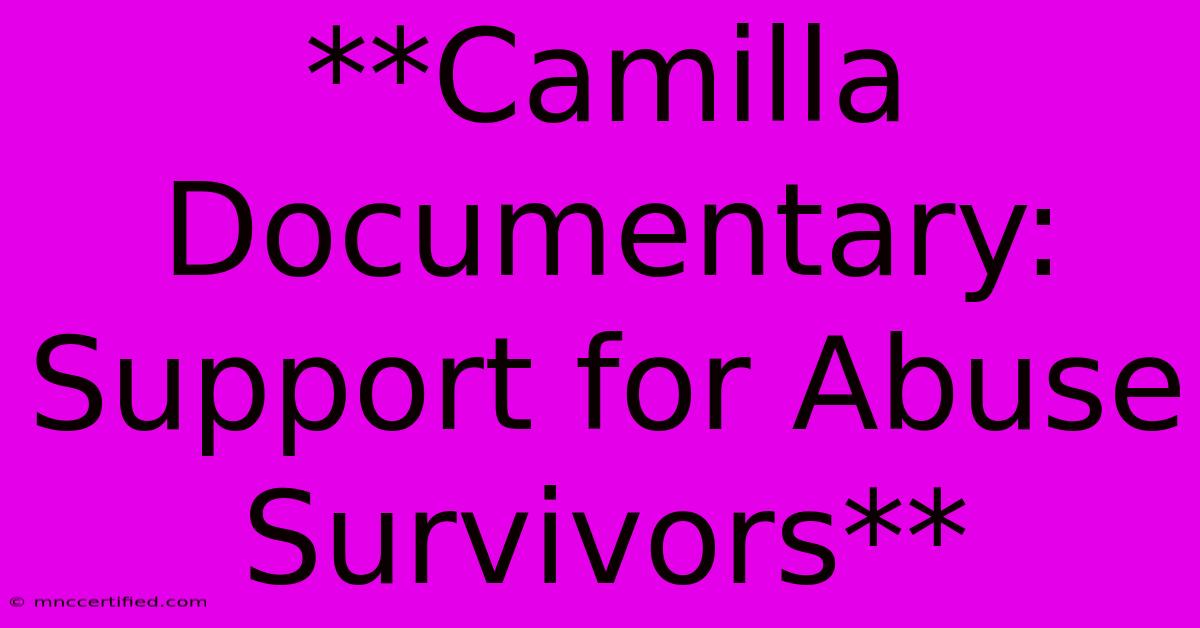**Camilla Documentary: Support For Abuse Survivors**

Table of Contents
Camilla Documentary: Support for Abuse Survivors
The recent documentary about Camilla, Queen Consort, has reignited conversations about the complexities of royal life and the importance of supporting survivors of abuse. While the documentary has been met with mixed reactions, one thing remains clear: the stories of survivors deserve to be heard and understood. This article aims to provide context around the documentary's impact and highlight resources available for those who have experienced abuse.
The Documentary's Impact: Sparking Difficult Conversations
The documentary explored the challenging dynamics within the royal family, including Camilla's past relationship with Prince Charles and the subsequent media scrutiny she faced. While some viewers focused on the historical context and royal drama, others found themselves drawn to the emotional toll of navigating such intense public scrutiny, particularly in light of the alleged abuse Camilla experienced in her youth.
This has sparked crucial conversations about the long-lasting effects of abuse, including the stigma and shame often associated with speaking out. The documentary highlights the importance of creating safe spaces for survivors to share their stories without fear of judgment.
Supporting Survivors: Where to Find Help
It's crucial to remember that survivors are not alone. There are numerous resources available to offer support, guidance, and healing. If you or someone you know has experienced abuse, please reach out for help. Here are some valuable resources:
- National Domestic Violence Hotline: 1-800-799-SAFE (7233) or visit .
- Rape, Abuse & Incest National Network (RAINN): 1-800-656-HOPE or visit .
- Childhelp USA: 1-800-422-4453 or visit .
These organizations provide confidential support, counseling, and information about legal options. They offer a lifeline for survivors seeking to break free from the cycle of abuse and begin their healing journey.
Moving Forward: Creating a Culture of Support
The Camilla documentary serves as a reminder that the impact of abuse can transcend personal lives and ripple outward. While the media frenzy around the royal family might fade, the importance of supporting survivors and creating a culture of empathy and understanding remains paramount. We can all contribute to this by:
- Learning about the signs of abuse and how to offer support.
- Challenging harmful stereotypes and promoting understanding of abuse dynamics.
- Creating a culture where survivors feel empowered to seek help and share their stories.
By taking these steps, we can create a world where survivors feel seen, heard, and empowered to thrive.
Remember: If you or someone you know is experiencing abuse, please reach out for help. There is support available.

Thank you for visiting our website wich cover about **Camilla Documentary: Support For Abuse Survivors**. We hope the information provided has been useful to you. Feel free to contact us if you have any questions or need further assistance. See you next time and dont miss to bookmark.
Featured Posts
-
Singles Day Growth Stalls In Chinas Market
Nov 12, 2024
-
Tesla Stock Climbs On Election Related News
Nov 12, 2024
-
Jerry Jones Responds To Stadium Curtains Criticism
Nov 12, 2024
-
Club Statement Transparency And Updates
Nov 12, 2024
-
Standard Guaranty Insurance Company
Nov 12, 2024